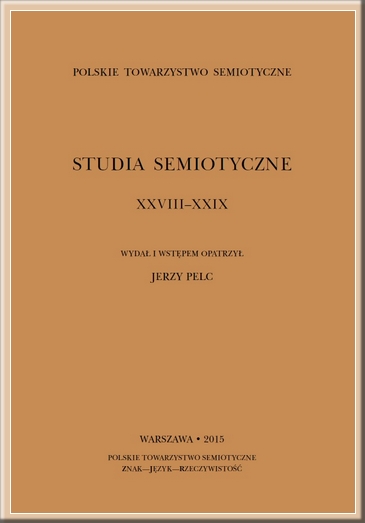Abstrakt
DOI: http://doi.org/10.26333/sts.xxviii.11
W artykule poddaję analizie słynne twierdzenie Saula Kripkego, że niektóre prawdy a priori są przygodne. Pokazuję, że wbrew tezie Kripkego, przy historycznym rozumieniu przygodności, pojęcia przygodności i aprioryczności stoją ze sobą w głębokim konflikcie. Przy tym rozumieniu przygodności przeszłość, którą można poznać a priori, nie jest przygodna, a o przyszłości, która jest przygodna, trudno zdobyć wiedzę a priori. Doprecyzowawszy tezę Kripkego, proponuję trzy sposoby jej obrony w kontekście historycznego rozumienia możliwości: (a) przez wprowadzenie pojęcia “faktycznej” przyszłości, (b) przez zastąpienie pojęcia aprioryczności pojęciem aprioryczności-wprzyszłości; (c) przez zastąpienie pojęcia aprioryczności pojęciem historycznej aprioryczności, a pojęcia przygodności pojęciem niegdyś-przygodności. W aneksie do artykułu przedstawiam formalną analizę postawionego przeze mnie problemu oraz trzech zaproponowanych przeze mnie rozwiązań w języku temporalno-modalnej logiki predykatów dla modeli indeterministycznego czasu.
Bibliografia
Belnap Nuel. 2002. Double time references: Speech-act reports as modalities in an indeterminist setting. W Advances in Modal Logic, vol. 3, F. Wolter, H. Wansing, M. de Rijke, M. Zakharyaschev (red.), 37–58. Singapore: World Scientific Publishing.
Belnap Nuel, Mitchell Green. 1994. "Indeterminism and the thin red line". Philosophical Perspectives 8 : 365–388.
Belnap Nuel, Michael Perloff, Ming Xu. 2001. Facing the Future: Agents and Choices in Our Indeterministic World. Oxford University Press.
BonJour Laurence. 1998. In Defense of Pure Reason. Cambridge University Press.
Casullo Albert. 1977. "Kripke on the a priori and the necessary". Analysis 37 : 152–159.
Chakravati Sitansu S. 1979. "Kripke on contingent a priori truths". Notre Dame Journal of Formal Logic 20 (4) : 773–6.
Chalmers David J. 2005. The foundations of two-dimensional semantics. W Two-Dimensional Semantics: Foundations and Applications, M. García-Carpintero, J. Macià (red.). Oxford University Press.
Davies Martin, Lloyd Humberstone. 1980. "Two notions of necessity". Philosophical Studies 38 (1) : 1–31.
Donnellan Keith S. 1966. "Reference and definite descriptions". The Philosophical Review 75 : 12–27.
Donnellan Keith S. 1977. "The contingent a priori and rigid designators". Midwest Studies in Philosophy 2 : 12–27.
Kaplan David. 1989. Afterthoughts. W Themes from Kaplan, J. Almong, J. Perry, H. Wettstein (red.), 565–614. Oxford University Press.
Kaplan David. 1989. Demonstratives: An essay on the semantics, logic, metaphysics, and epistemology of demonstratives and other indexicals. W Themes from Kaplan, J. Almong, J. Perry, H. Wettstein (red.), 481–563. Oxford University Press.
Kotarbiński Tadeusz. 1913. "Zagadnienie istnienia przyszłości". Przegląd Filozoficzny 16 (1) : 74–92.
Kripke Saul. 1988. Nazywanie i konieczność. Tłum. Bohdan Chwedeńczuk. Warszawa: Instytut Wydawniczy Pax.
Łukasiewicz Jan. 1961. O determinizmie. W Z zagadnień logiki i filozofii, J. Słupecki (red.). Warszawa: PWN.
MacFarlane John. 2008. Truth in the garden of forking paths. W Relative Truth, M. García-Carpintero, M. Kölbel (red.), 81–102. Oxford University Press.
Malpass Alex, Jacek Wawer. 2012. "A future for the thin red line". Synthese 188 (1) : 117–142.
Øhrstrøm Peter, Per F. V. Hasle. 1995. Temporal Logic: From Ancient Ideas to Artificial Intelligence. Dordrecht: Kluwer.
Peirce Charles Sanders. 1958. The Collected Papers of Charles Sanders Peirce, vol. 1–8. Charles Hartshorne, Paul Weiss, Arthur W. Burks (red.). Harvard University Press.
Placek Tomasz, Nuel Belnap. 2012. "Indeterminism is a modal notion: Branching spacetimes and Earman’s pruning". Synthese 187 (2) : 441–469.
Ploug Thomas, Peter Øhrstrøm. 2012. "Branching time, indeterminism and tense logic". Synthese 188 (3) : 367–379.
Prior Arthur. 1967. Past, Present and Future. Oxford University Press.
Soames Scott. 2003. Philosophical analysis in the twentieth century, vol. 2. Princeton University Press.
Stalnaker Robert. 1978. Assertion. Syntax and Semantics 9 : 315–332.
Stalnaker Robert. 1999. Context and Content: Essays on Intentionality in Speech and Thought. Oxford University Press.
Thomason Richmond H. 1970. Indeterminist time and truth-value gaps. Theoria 36 : 264–281.
Thomason Richmond H. 1984. Combinations of tense and modality. W Handbook of Philosophical Logic, vol. 2, D. Gabbay, F. Guenthner (red.). Dordrecht: Reidel.
Turri John. 2011. "Contingent a priori knowledge". Philosophy and Phenomenological Research 83 (2) : 327–344.
Wawer Jacek. 2014. "The truth about the future". Erkenntnis 79 : 365–401.


